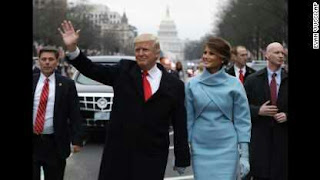Donald Trump's first address as US president wasn't just watched by Americans -- the world was listening too, and for now, his inaugural remarks have left some depressed, many wary and everyone waiting for more.After Trump's swearing in, the newly minted president gave a short speech that was light on policy specifics, but hit hard on many of his campaign themes, including protectionism, trade-skepticism and an "America First" isolationism.The tenor and content of the speech left some diplomats "depressed," they said, and sparked an emergency meeting in Canada, one of the largest US trading partners.While some are stressing a need to wait and see what actions follow Trump's broad-brush rhetoric, international envoys and editorial pages also picked up on what the president didn't say -- his to reaffirm the traditional American role as a global leader of an international community."The message was 'America First and screw everyone else,' " said one Arab diplomat."That mind frame is not lost on the world and it is not good for the United States."A Western diplomat said Trump's speech translated to her country as a message that the new US posture will be "America first and we will see about the rest of the world if we have time," a message that left people "depressed."Countries formally welcomed the new president and some quickly issued Trump invitations or accepted them. Israeli President Reuven Rivlin published a letter inviting Trump to visit, while British officials said Prime Minister Teresa May will come to Washington next week for a meeting with Trump that will almost certainly touch on thebroad range of UK-US security and intelligence cooperation issues.Russia, which has celebrated Trump's election, said Prime Minister Vladimir Putin will call Trump in the coming days. Kremlin spokesman Dmitry Peskov said Saturday on Russia's Channel One network that this was a "diplomatic necessity" given various US-Russia issues, including nuclear disarmament and Syria."The acting administration will have to be introduced to all the nuances of our bilateral ties," he said.Trump's remarks, which clocked in under 20 minutes, skated over familiar campaign themes, some put more baldly than others. He said protectionism would lead to strength, blasted other countries for the economic woes of the US, questioned the investment in security alliances, and painted a dark picture of weak borders that allow the US to be pillaged by "the ravages of other countries."The Times of London, a conservative paper owned by Rupert Murdoch, said in an editorial that the president painted a "bleak" picture of "American carnage." The left-leaning Guardian, on its editorial pages, called the speech "by turns bitter, blowhardand banal" and noted that "in 1933, Roosevelt challenged the world to overcome fear. In 2017, Mr Trump told the world to be very afraid."A slew of leaders reached out to Trump quickly to try to establish a relationship with the new administration, among them Mexican President Enrique Pena Nieto. The southern US border is an intense focus for Trump, who has promised to build a wall there and have Mexico pay for it.Pena Nieto's congratulatory call Saturday morning stressed Mexico's willingness to work on an agenda that would benefit both countries, according to his office, as well asthe need to focus on respect for sovereignty and shared responsibility.White House spokesman Sean Spicer said later that Trump and Pena Nieto "talked about a visit on trade, immigration and security" that is to occur on January 31. It's unclear where the meeting will take place.Mexico, the US and Canada form the North American Free Trade Agreement, which Trump, in a statement posted on the White House website Friday, pledges to unilaterally withdraw from if the other two nations don't agree to renegotiate the pact.Little surprise then that Canadian Prime Minister Justin Trudeau also called Trump Saturday to stress the importance of Canada-US ties and remind Trump that 35 states count Canada as their top destination for exports.Trudeau had to calm the frayed nerves of Canadian provincial leaders in a Friday phone call with them. Canada is the US' second-largest trading partner after China, with more than 70% of Canadian exports going to the US. The Prime Minister's office said he spoke to the leaders about efforts to find common ground with the new US administration.Diplomats said Trump's inaugural speech left them deeply concerned about the US commitment to international security networks and organizations like NATO, particularly given Trump's assertion that the US had "subsidized the armies of other countries while allowing for the very sad depletion of our military."Trump has dismissed NATO, seen as the core US security alliance, as "obsolete" and questioned whether the US should continue to led security support to South Korea and Japan, both of which pay for that help. And he has unsettled friends and foes alike in 140-character blasts on Twitter.Diplomats said they were looking to the speech for reassurance that the US remains anchored in its commitment to allies.

No comments:
Post a Comment